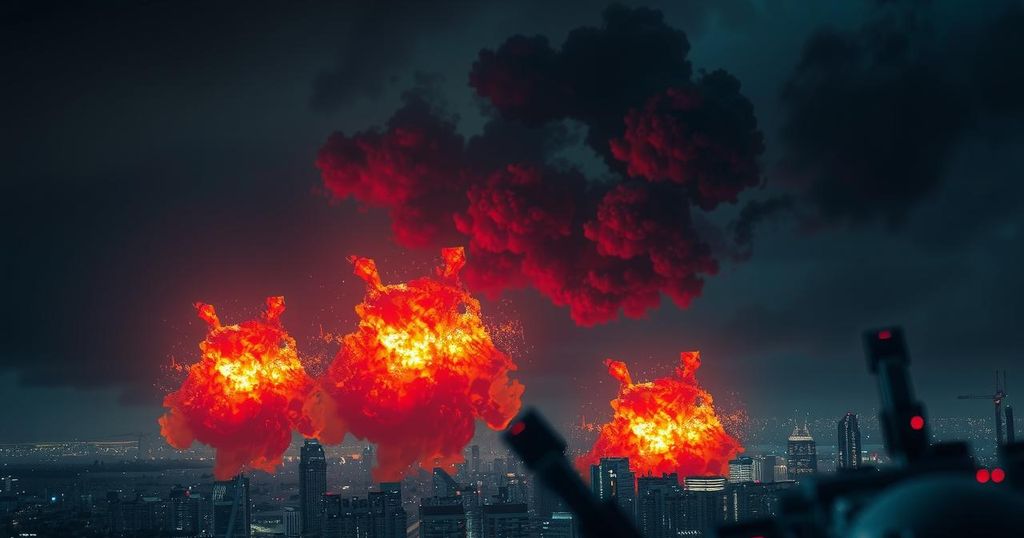Israel Launches Preemptive Strikes on Iranian Nuclear and Military Sites

Israel launched strikes against Iranian nuclear and military sites, stating it was a necessary action for self-defense. U.S. officials confirmed no involvement in the strikes. Prime Minister Netanyahu emphasized the ongoing threat from Iran, while Israel braces for possible retaliation. The strikes raise significant geopolitical tensions and test U.S. diplomatic efforts.
In a dramatic escalation of tensions, Israel commenced a series of strikes on Iranian military and nuclear sites early Friday, targeting what they described as threats to their national security. An Israeli military official disclosed that these attacks were not isolated but part of a broader offensive aimed at dismantling Iran’s missile capabilities and nuclear ambitions. The operation consisted of “dozens of targets” spread throughout the Islamic Republic, signaling a significant military initiative.
Meanwhile, U.S. Secretary of State Marco Rubio emphasized that the United States neither participated nor assisted in these operations. He referenced the strikes as Israel’s unilateral response to perceived threats: “Tonight, Israel took unilateral action against Iran. We are not involved in strikes against Iran and our top priority is protecting American forces in the region.” The strike was portrayed as a necessary measure for self-defense by the Israeli government, with former Prime Minister Naftali Bennett labeling Iran as a “clear and present danger” to both Israel and the Middle East.
Speaking on CNN, Prime Minister Netanyahu confirmed the strikes and outlined their intent in an urgent televised address, stating, “This operation will continue for as many days as it takes to remove this threat.” He acknowledged Iran’s capability to produce nuclear weapons if not confronted, further amplifying concerns regarding regional security. Netanyahu’s comments suggest a strategic move not just to safeguard Israel but to protect its neighboring Arab states, all of whom face threats from Iranian aggression.
In anticipation of retaliation, Israel has declared a state of emergency, affecting schools and public gatherings, as sirens wailed across Jerusalem. The Israel Defense Forces ramped up their readiness, moving the nation to a defensive posture aimed at mitigating any immediate threats. Reports suggest that Iranian military leaders were among the targets, raising the stakes for potential retaliatory measures from Tehran.
As Israel navigates this precarious situation, the U.S. administration is under scrutiny. President Trump, amidst an internal Cabinet meeting convened to address the situation, hinted at the precarious nature of these developments. He remarked, “I don’t want them going in because, I mean, that would blow it,” a reference to the risks associated with heightened Israeli action. Sources indicate the administration had anticipated such strikes were imminent yet hoped for a diplomatic solution.
Despite the tensions, GOP Senator Ted Cruz supported Israel’s actions, labeling them a necessary defense strategy against a nuclear-capable Iran. He remarked, “Israel has an incredible military… a nuclear Iran would be a profound threat to Israel and America.” This statement reflects a broader sentiment within parts of the U.S. legislative body that aligns closely with Israeli security perspectives.
In a stark illustration of how seriously the conflict could escalate, Israeli sources warned of potential Iranian retaliation that would exceed previous attacks on Israel. This presents another complex chapter for the Trump administration, whose diplomatic efforts face a critical test amid fast-evolving regional dynamics. Israel has articulated a commitment to pursue military operations against Iran until it feels assured that the nuclear threat has been effectively neutralized, though some doubts linger regarding the feasibility of such objectives through military means alone.
Israel’s strikes on Iran mark a significant escalation in military tensions, with implications for both regional stability and U.S. foreign policy. The strikes are presented as a necessary action against a nuclear-capable adversary, challenging diplomatic efforts in the region. As Israel braces for Iranian reprisals, the international community watches closely, raising questions about the future of diplomacy in a tumultuous Middle East. The situation remains fluid, with high stakes for both national security and international relations.
Original Source: www.cnn.com








